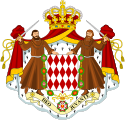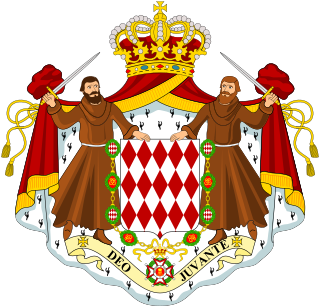 |
|---|
General elections were held in Monaco on 15 December 1946 with a second round on 22 December 1946 to elect the 18 members of the National Council.
 |
|---|
General elections were held in Monaco on 15 December 1946 with a second round on 22 December 1946 to elect the 18 members of the National Council.
Voters can either choose a party list or choose candidates from various lists ("panachage") for the 18 seats. To be elected a candidate must receive a majority of valid votes. If the 18 seats are not filled in the first round, the remaining seats are elected in a second round by a simple majority.
| Candidates | Votes |
|---|---|
| Jean-Charles Marquet | 483 |
| Louis Auréglia | 397 |
| Joseph Fissore | 360 |
| Charles de Castro | 359 |
| Michel Fontana | 358 |
| Charles Bernasconi | 354 |
| Étienne Boéri | 349 |
| Dr. Bernasconi | 346 |
| Jean-Marie Notari | 346 |
| Jean-Charles Rey | 339 |
| Valid ballots | 677 |
| Invalid ballots | 19 |
| Total ballots | 696 |
| Registered voters | 888 |
| Source: Journal de Monaco [1] | |
| Candidates | Votes |
|---|---|
| Auguste Médecin | 332 |
| Georges Blanchy | 309 |
| Arthur Crovetto | 302 |
| Robert Boisson | 296 |
| Dr. Joseph Simon | 293 |
| Guy Brousse | 285 |
| Jean Sbarrato | 277 |
| Robert Sanmori | 271 |
| Valid ballots | 635 |
| Invalid ballots | 7 |
| Total ballots | 642 |
| Registered voters | 888 |
| Source: Journal de Monaco [2] | |

Guinea elects on the national level a head of state—the president—and a legislature. The president is elected for a five-year term by the people through a two-round system. The National Assembly has 114 members, elected for five-year terms, 38 members in single-seat constituencies and 76 members by proportional representation.

General elections were held in Monaco on 9 February 2003. The result was a victory for the Union for Monaco alliance, which won 21 of the 24 seats in the National Council. Within the alliance, twelve seats were won by the Union for the Principality, four by the National Union for the Future of Monaco, three by Promotion of the Monegasque Family and two by Rally for Monaco.

General elections were held in Monaco on 3 February 2008. The Union for Monaco was re-elected, though with a reduced margin of victory.

General elections were held in Monaco on 19 January 1958. The result was a victory for the National Union of Independents, which won 11 of the 18 seats in the National Council.

General elections were held in Monaco on 25 February and 3 March 1963. The elections were the first since the promulgation of a new constitution implemented after Prince Rainier III relinquished his absolute rule over the principality, and the first in which women were permitted to vote. The result was a victory for the National and Democratic Union, which won 17 of the 18 seats in the National Council.

General elections were held in Monaco on 24 March 1968. The result was a victory for the National and Democratic Union, which won all 18 seats in the National Council.

General elections were held in Monaco on 4 February 1973, with a second round of voting on 11 February. The result was a victory for the National and Democratic Union, which won 16 of the 18 seats in the National Council.

General elections were held in Monaco on 15 January 1978. The result was a victory for the National and Democratic Union, which won all 18 seats in the National Council.

General elections were held in Monaco on 9 January 1983. The result was a victory for the National and Democratic Union, which won all 18 seats in the National Council.

General elections were held in Monaco on 24 January 1988. The result was a victory for the National and Democratic Union, which won all 18 seats in the National Council.

General elections were held in Monaco on 24 January 1993, with a second round of voting on 31 January. The result was a victory for the National and Democratic Union, which won 15 of the 18 seats in the National Council, the first time since 1973 that it had failed to win all 18 seats.

General elections were held in Monaco on 1 February 1998, with a second round of voting on 8 February. The result was a victory for the National and Democratic Union, which won all 18 seats in the National Council.

General elections were held in Monaco on 10 February 2013. The result was a victory for the Horizon Monaco alliance, which won 20 of the 24 seats in the National Council.

General Council elections were held in Chad on 15 December 1946, with a second round of voting on 12 January 1947.

General elections were held in Monaco on 11 February 2018. Since the General Election of 2013, the largest party, Horizon Monaco, split, which led to the formation of a new political party – Primo! Priorite Monaco. The latter won 58% of the vote, while the other parties, Horizon Monaco and Union Monégasque got 26% and 16% respectively. This led to a 21-seat gain for Primo!, with the 3 remaining seats being divided between Horizon Monaco and Union Monégasque.
The 2003 Monegasque municipal elections were held on 2 March to elect the 15 members of the Communal Council of Monaco.
The 1991 Monegasque municipal elections were held on 10 and 17 February to elect the 15 members of the Communal Council of Monaco.

General elections were held in Monaco on 5 February 2023. The result was a landslide victory for the governing Monegasque National Union led by Brigitte Boccone-Pagès, which won all 24 seats on the National Council. The new council was sworn in on 16 February.

The electoral system of Brazil is the set of means used to choose representatives and government members of the Federative Republic of Brazil. The current system is defined by the 1988 Constitution and the Electoral Code, in addition to being regulated by the Superior Electoral Court as delegated by law. The Constitution itself already defines three distinct electoral systems, which are detailed in the Electoral Code: proportional elections for the Chamber of Deputies, mirrored in the legislative powers at the state and municipal levels, majority elections with one or two elected representatives to the Federal Senate and majority elections in two rounds for president and other executive heads in other spheres.

General elections were held in Monaco on 8 January 1950 with a second round on 15 January 1950 to elect the 18 members of the National Council.